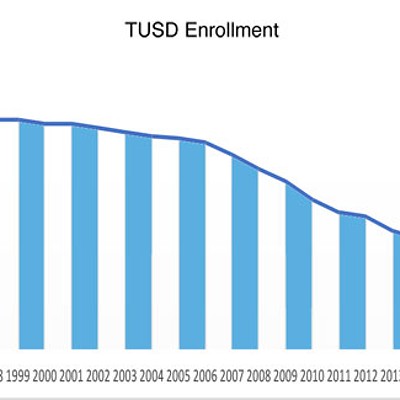The Republicans running state government struck back against the federal Democratic health-care reform plan last week.
At the behest of Gov. Jan Brewer, lawmakers let the federal government know they were ready to sue over the reform plan, arguing that it costs too much money, and it's unconstitutional to require every Arizonan to buy health insurance.
Political posturing aside, lawmakers took no steps to actually deal with the ramifications of the health-care makeover—namely, that the state will have to re-establish KidsCare (a program that provides kids with health insurance) and restore funding for Healthy Arizona, a voter-approved program that gives health insurance to hundreds of thousands of Arizonans who, as of now, would lose coverage on Jan. 1, 2011.
Both programs were cut in order to save around $385 million in state spending next year. But the Brewer administration and some lawmakers have said they expect that the funding will have to be restored to keep the state from losing as much as $7 billion annually in federal funding.
While lawmakers avoid dealing with the problem, help may yet be on the way from the federal government. Congressional Democrats are close to finalizing legislation that would provide $393 million in federal money to cover the Healthy Arizona costs next year.
While Brewer has been sharply critical of health-care reform, she supports the efforts to provide federal funding to Arizona.
While the federal government will eventually be picking up much of the tab for future enrollees in health-care programs, the spending requirements are putting even more of a strain on the state's structural imbalance. The state still spends more than it brings in, and the upcoming year's budget relies on one-time raids of other funds to keep the state afloat.
Sen. Bob Burns say the structural deficit will be as high as $2 billion if voters don't approve a one-cent sales tax in May.
Despite that, GOP lawmakers are still trying to pass a tax-cut package. The Senate Finance Committee was scheduled this Wednesday, April 7, to take up a package passed by Republicans in the Arizona House of Representatives.
The so-called Job Recovery Act that passed the House of Representatives was designed to reduce taxes for Arizona's highest earners and corporations while hiking taxes on homeowners.
The Joint Legislative Budget Committee staff has estimated that the tax-cut package will cost the state $171 million in fiscal year 2012, and $941 million annually when it's fully implemented in 2017.
The bill will cut business property taxes, forcing school districts and county governments to increase taxes on homeowners to make up the difference if they are to continue to collect the same amount of revenue to pay for education programs and other government services.
Supporters, such as Sen. Frank Antenori, say that the tax changes will spur economic activity that will make up for the lost tax revenue.
But the JLBC staff notes in a report that increased economic activity from tax cuts such as these ranges from a nickel to 18 cents for every dollar cut.
The bill has the support of Arizona Chamber of Commerce executive director Glenn Hamer, who argues that the state should cut business taxes to become more competitive.
Senate President Bob Burns, who had held the bill while the budget was being negotiated, has said he expects some changes in the bill.
Earlier this week, the bill was being changed to strip out the income-tax cuts and make other changes, according to a report in the Arizona Capitol Times.
Lawmakers are also working on a collection of bills designed to transform Arizona into a conservative vision that includes looser firearms laws, defiance of the federal government and restrictions on immoral behavior.
Take SB 1309, a bill that would require minors to get parental permission before they could get prescriptions for birth-control meds—or even treatment for sexually transmitted diseases. Essentially, lawmakers are supporting a bill that would encourage the spread of communicable diseases among young people to punish them for having sex.
It's a similar story with House Bill 2650, which would extend the amount of time it takes to divorce your spouse. Right now, it's a minimum of two months, but HB 2650 would extend it to a half-year, although it was recently amended so that unhappy couples can still get a quickie divorce if both agree that they want to split.The bill is up for debate on the House floor this week.
We're also seeing the emergence of "strikers," or new legislation that replaces bills that have already been vetted through the committee process.
One of them is SB 1110, which would require all cities and towns to hold elections in even-numbered years. Under the current system, many cities and towns have elections in off years, while little else is on the ballot.
While turnout tends to be lower in those elections, they help reduce the amount of information that voters have to absorb in any given election cycle. If the bill passes, voters will not only have to get up to speed on county, state and federal candidates along with a variety of state ballot propositions; they'll also have to learn about their City Council candidates and local propositions at the same time.
Even if this is a good idea, is it such an urgent problem that it can't go through the normal committee process?
Several bills we're tracking will be considered in the House Judiciary Committee on Thursday, April 8.
• SCR 1009 would ask voters to amend the state Constitution to prohibit the use of any public funds for political campaigns, essentially gutting Clean Elections.
• SCR 1013 would ask voters to change the title of Arizona's secretary of state to lieutenant governor, so voters would realize that the position is next in line to the governor.
• Prosecutors are looking for a new law against "sexting," since they don't want to slap teens with child-porn charges every time they make short-sighted decisions about sharing pics of their nasty parts with each other. SB 1266 would create a misdemeanor that could include up to four months in jail, although teens could also be sent to a diversion program or put on probation.
Among the other bills we're following:
• Sen. Russell Pearce's omnibus immigration bill passed the House Military Affairs and Public Safety last Wednesday, March 31. Among other provisions related to rounding up illegal immigrants, SB 1070 allows the authorities to impound your car if you give a ride to a migrant who has entered the country illegally, and makes it easier for police to run sting operations on businesses to see if they can persuade them to break Arizona's employer-sanctions law.
• Arizona is one step closer to getting rid of laws against carrying concealed weapons without a permit. SB 1108 passed the Senate on Monday, March 29. A companion bill, HB 2347, is close to a final vote in the House.
• HB 2337, Sen. Frank Antenori's legislation to allow companies to set up shop in Arizona to manufacture traditional incandescent light bulbs after 2012—in defiance of federal regulations banning incandescent bulbs that range from 40 to 100 watts—passed the Senate Commerce and Economic Development Committee on Tuesday, March 30.
• HB 2246, which would legalize sparklers in Arizona, passed the Senate Public Safety and Human Services Committee on Wednesday, March 31.
For more legislative tidbits, follow the Blogislature, the Tucson Weekly's bill-tracking headquarters, on The Range.















